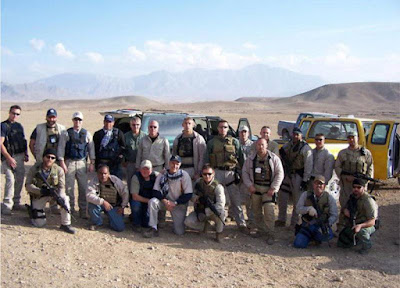The services of private contractors are used around the world. P. W. Singer, author of Corporate Warriors: The Rise of the Privatized Military Industry says, “In geographic terms, it operates in over 50 different countries. It’s operated in every single continent but Antarctica.” According to stats, in the 1990s there used to be 50 military personnel for every 1 contractor, and now the strength ratio is 10 to 1.
...... These private military company (PMCs) will actually serve as alternative forms of power application abroad through irregular means, without violating international law, without causing troubles in the domestic or public policy, or too many international repercussions.
According to the US State Department, thousands of private military contractors served and are serving in Iraq and Afghanistan. In Iraq, these contractors mostly provide security to high profile personalities or protect sensitive installations such as oil refineries. In Afghanistan, these contractors are quickly replacing US military and are engaged in training the Afghan National Army and police. These contractors are also expected to take a lead role in anti-Taliban/ISIS operations in the war-torn country after the withdrawal of US forces. This has raised fears of increased war crimes since International Humanitarian Law consider private contractors as unlawful combatants since they generally do not respect laws of war and do not carry any military insignia which may help identify their allegiances.
......
We need them
Pakistan has a standing army of almost 560,000 soldiers and officers in addition to almost a 100,000 reserves. The army is stationed across the length and breadth of the country and is involved in counterinsurgency and counterterrorism operations. The army is often called to assist civilian administrations especially during natural calamities or to curb civil unrest.
......
"However, unfortunately, Pakistan’s economic growth has stagnated and declined over the past decade. This has made it practically impossible for the military to be rearmed with the state of the art weaponry which has resulted in a conventional disadvantage viz-a-viz its arch-rival. Pakistan’s deterrence capabilities are enough to neutralize any threat from the east but the emerging hybrid threats within the country has overstretched the army.
For example, the army had to raise an entire new division to protect CPEC from asymmetrical threats in Baluchistan and Gilgit-Baltistan. The army was also tasked with training the police and paramilitary forces and providing backup to them whenever necessary. This strained the military’s resources. But it has a pragmatic solution. Private Military Companies.
Many soldiers and officers retire from the army at a young age. These men are forced to move to the private sector which neither suits them nor are they trained for it. By establishing such companies (the current private companies are sub-standard) having international standards, Pakistan can not only provide job opportunities to thousands of men but also relieve pressure on the over-stretched security apparatus of the country.
These trained men can be employed to protect vital infrastructure, trade routes, high profile personalities, train law enforcement agencies in addition to being a strategic reserve in case of a major war. " ......
---
Excerpted from an article written by Zeeshan Munir at https://www.globalvillagespace.com/
...... These private military company (PMCs) will actually serve as alternative forms of power application abroad through irregular means, without violating international law, without causing troubles in the domestic or public policy, or too many international repercussions.
According to the US State Department, thousands of private military contractors served and are serving in Iraq and Afghanistan. In Iraq, these contractors mostly provide security to high profile personalities or protect sensitive installations such as oil refineries. In Afghanistan, these contractors are quickly replacing US military and are engaged in training the Afghan National Army and police. These contractors are also expected to take a lead role in anti-Taliban/ISIS operations in the war-torn country after the withdrawal of US forces. This has raised fears of increased war crimes since International Humanitarian Law consider private contractors as unlawful combatants since they generally do not respect laws of war and do not carry any military insignia which may help identify their allegiances.
......
We need them
Pakistan has a standing army of almost 560,000 soldiers and officers in addition to almost a 100,000 reserves. The army is stationed across the length and breadth of the country and is involved in counterinsurgency and counterterrorism operations. The army is often called to assist civilian administrations especially during natural calamities or to curb civil unrest.
......
"However, unfortunately, Pakistan’s economic growth has stagnated and declined over the past decade. This has made it practically impossible for the military to be rearmed with the state of the art weaponry which has resulted in a conventional disadvantage viz-a-viz its arch-rival. Pakistan’s deterrence capabilities are enough to neutralize any threat from the east but the emerging hybrid threats within the country has overstretched the army.
For example, the army had to raise an entire new division to protect CPEC from asymmetrical threats in Baluchistan and Gilgit-Baltistan. The army was also tasked with training the police and paramilitary forces and providing backup to them whenever necessary. This strained the military’s resources. But it has a pragmatic solution. Private Military Companies.
Many soldiers and officers retire from the army at a young age. These men are forced to move to the private sector which neither suits them nor are they trained for it. By establishing such companies (the current private companies are sub-standard) having international standards, Pakistan can not only provide job opportunities to thousands of men but also relieve pressure on the over-stretched security apparatus of the country.
These trained men can be employed to protect vital infrastructure, trade routes, high profile personalities, train law enforcement agencies in addition to being a strategic reserve in case of a major war. " ......
---
Excerpted from an article written by Zeeshan Munir at https://www.globalvillagespace.com/












